 28 citations,
December 2005 in “Journal of cosmetic dermatology”
28 citations,
December 2005 in “Journal of cosmetic dermatology” Apple procyanidin applied to the scalp may help grow hair without side effects.
 January 2025 in “Journal of Cosmetic Dermatology”
January 2025 in “Journal of Cosmetic Dermatology” Exosomes are important for skin treatments and hair growth but need more research for safe and effective use.
 1 citations,
April 2024 in “International Research Journal of Modernization in Engineering Technology and Science”
1 citations,
April 2024 in “International Research Journal of Modernization in Engineering Technology and Science” Herbal shampoo cleans hair well and is safer than regular shampoos.
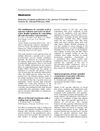 11 citations,
July 2004 in “International Journal of Cosmetic Science”
11 citations,
July 2004 in “International Journal of Cosmetic Science” The conclusion is that a new method to measure hair shine was confirmed to match people's visual assessments.
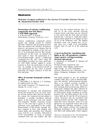 11 citations,
January 2006 in “International Journal of Cosmetic Science”
11 citations,
January 2006 in “International Journal of Cosmetic Science” Some oils can penetrate hair and reduce the stickiness between fibers, but mineral oil cannot.
 August 2023 in “International Journal of Cosmetic Science”
August 2023 in “International Journal of Cosmetic Science” Rosemary extracts, specifically compounds like rosmarinic acid and carnosic acid, can protect hair from UV damage.
 47 citations,
July 2014 in “European Journal of Pharmaceutics and Biopharmaceutics”
47 citations,
July 2014 in “European Journal of Pharmaceutics and Biopharmaceutics” Scientists created a gel with nanoparticles to deliver medicine to hair follicles effectively.
 5 citations,
May 2021 in “International Journal of Cosmetic Science”
5 citations,
May 2021 in “International Journal of Cosmetic Science” Healthy scalp leads to better hair quality and less damage.
 18 citations,
January 2017 in “Dermatologic Surgery”
18 citations,
January 2017 in “Dermatologic Surgery” Combining cosmetic procedures with lifestyle changes improves antiaging results.
51 citations,
September 2012 in “Biomacromolecules” Disulfide bonds make keratin in hair stronger and tougher.
4 citations,
July 2010 in “International Journal of Cosmetic Science” Curved human hair has different structures on its convex and concave sides.
 9 citations,
November 2018 in “Journal of cosmetic dermatology”
9 citations,
November 2018 in “Journal of cosmetic dermatology” Orobanche rapum extract rejuvenates skin and protects skin bacteria, leading to healthier skin.
 January 2024 in “Journal of cosmetic dermatology”
January 2024 in “Journal of cosmetic dermatology” Silibinin-loaded micelles significantly protect hair from UV-B damage.
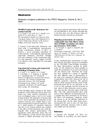 3 citations,
September 2005 in “International Journal of Cosmetic Science”
3 citations,
September 2005 in “International Journal of Cosmetic Science” Different oils penetrate hair differently; monounsaturated oils like olive oil penetrate better than polyunsaturated oils.
 72 citations,
July 2003 in “Journal of cosmetic dermatology”
72 citations,
July 2003 in “Journal of cosmetic dermatology” Frequent hair coloring and styling can damage hair and cause breakage or loss.
 2 citations,
July 2023 in “Journal of Cosmetic Dermatology”
2 citations,
July 2023 in “Journal of Cosmetic Dermatology” The topical treatment reduced hair loss and improved hair growth in patients with certain types of hair loss.
 6 citations,
October 2016 in “Food Science and Biotechnology”
6 citations,
October 2016 in “Food Science and Biotechnology” The water extract of Bituminaria bituminosa, high in phenolic compounds, shows strong antioxidant and enzyme inhibitory potential.
67 citations,
May 2016 in “Journal of Cosmetic Dermatology” Peptides, proteins, and growth factors in skincare show promise for improving skin health.
 July 2024 in “Clinical Cosmetic and Investigational Dermatology”
July 2024 in “Clinical Cosmetic and Investigational Dermatology” Non-drug therapies show promise for hair regrowth but need more research.
203 citations,
May 2017 in “Journal of controlled release” Microneedles are being used and tested for various medical and cosmetic treatments.
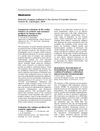 7 citations,
November 2004 in “International Journal of Cosmetic Science”
7 citations,
November 2004 in “International Journal of Cosmetic Science” Hair breaks differently when wet or dry and is affected by its condition and treatments like perms and bleaching.
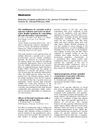 7 citations,
July 2004 in “International Journal of Cosmetic Science”
7 citations,
July 2004 in “International Journal of Cosmetic Science” Different hair types from various ethnic groups affect hair shine due to characteristics like thickness and shape.
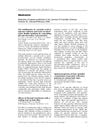 22 citations,
July 2004 in “International Journal of Cosmetic Science”
22 citations,
July 2004 in “International Journal of Cosmetic Science” UV radiation and visible light can damage hair, but there are ways to protect it.
 August 2018 in “Journal of The American Academy of Dermatology”
August 2018 in “Journal of The American Academy of Dermatology” The moisturizing cream used after a chemical peel was well tolerated and effectively moisturized the skin.
 5 citations,
January 2021 in “Journal of Cosmetic Dermatology”
5 citations,
January 2021 in “Journal of Cosmetic Dermatology” Topical cetirizine 1% promotes hair growth in male androgenetic alopecia patients.
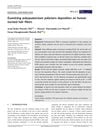 4 citations,
November 2017 in “Journal of Cosmetic Dermatology”
4 citations,
November 2017 in “Journal of Cosmetic Dermatology” Certain polymers can stick to hair and increase volume, working best at a pH of 7 to 9.
 3 citations,
January 2018 in “International Journal of Cosmetic Science”
3 citations,
January 2018 in “International Journal of Cosmetic Science” Hair stiffness increased by 13.2% after caffeine treatment, validating the Stiffness-Angle Law as an effective measurement method.
 4 citations,
February 2017 in “Journal of Cutaneous Medicine and Surgery”
4 citations,
February 2017 in “Journal of Cutaneous Medicine and Surgery” Compounds from certain trees used by First Nations people show potential for treating skin conditions and promoting hair growth, but more research is needed to confirm their safety and effectiveness.
 4 citations,
December 2010 in “Copernican Letters”
4 citations,
December 2010 in “Copernican Letters” Synthetic polypeptides in cosmetics may help with anti-aging, but their effectiveness on real skin is uncertain.
 5 citations,
October 2022 in “Cosmetics”
5 citations,
October 2022 in “Cosmetics” Cell-based models help test if cosmetic ingredients really work for hair growth and skin health.


























